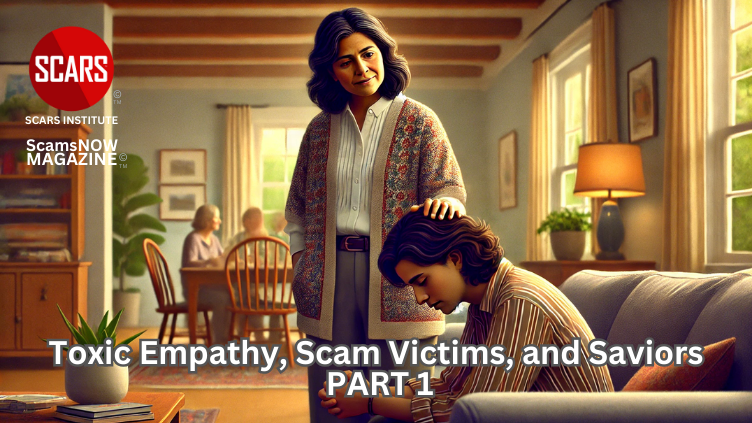Nihilism and the Darker Side for Traumatized Scam Victims After a Relationship Scam
Scam Victim Nihilism: The Dark Desire for Self-Destruction – How Scam Victims Reject Emotional and Psychological Recovery
Primary Category: Scam Victim Recovery Psychology
Intended Audience: Scam Victims-Survivors / Family & Friends
Authors:
• Vianey Gonzalez B.Sc(Psych) – Licensed Psychologist, Specialty in Crime Victim Trauma Therapy, Neuropsychologist, Certified Deception Professional, Psychology Advisory Panel & Director of the Society of Citizens Against Relationship Scams Inc.
• Tim McGuinness, Ph.D., DFin, MCPO, MAnth – Anthropologist, Scientist, Polymath, Director of the Society of Citizens Against Relationship Scams Inc.
About This Article
Scam victim nihilism is a deep psychological and neurological descent into self-destruction, driven by overwhelming loss, shattered trust, and unresolved grief. Unlike typical despair, this state manifests as a willful rejection of recovery, where victims not only feel hopeless but actively sabotage their lives. It emerges through a combination of psychological trauma and neurological changes—overactivation of the brain’s fear center, impaired rational decision-making, and a weakened reward system—leaving victims feeling numb, reckless, and disconnected.
Emotionally, this nihilism presents as apathy, cynicism, and detachment, while behaviorally, it can lead to financial ruin, self-neglect, and dangerous risk-taking. Recognizing these warning signs is critical, both for victims themselves and for those trying to support them. Overcoming this state requires intentional action: rebuilding structure, reconnecting with others, challenging self-destructive thoughts, and seeking professional guidance.
The scam may have stolen money, trust, and stability, but it does not have to claim a victim’s entire future. Recovery is possible—one deliberate step at a time—by choosing to reclaim meaning rather than succumbing to destruction.

Scam Victim Nihilism: The Dark Desire for Self-Destruction – How Scam Victims Reject Emotional and Psychological Recovery
The Dark Side of Scam Victim Psychology: Scam Victim Nihilism and Self-Destruction
When a scam ends, the fallout isn’t just financial—it’s a psychological earthquake. For some victims, the loss ignites a chilling shift: scam victim nihilism, a willful craving for self-destruction. This isn’t mere despair; it’s a deliberate unraveling, a rejection of meaning after trust shatters. These individuals don’t just mourn their losses—they turn inward, seeking to dismantle their own lives.
The Hidden Struggle of Scam Victims
Surviving a scam is often seen as the end of the worst part of the experience, but for some victims, the real battle begins afterward. While many scam victims go through the well-known emotional stages of grief, anger, and recovery, a subset of victims fall into a much darker psychological state—scam victim nihilism. This is the willful descent into self-destruction, an internalized belief that nothing matters anymore because their world has been irreparably broken. Unlike typical depression or despair, this particular reaction is marked by an active, even deliberate, push toward self-sabotage.
Scam victim nihilism is an extreme psychological response where the victim begins to see their own suffering as meaningless, their identity as permanently damaged, and their future as undeserving of hope. This state can be devastating not just for the victims themselves, but for those who care about them and try to offer support. Understanding how this nihilism forms, manifests, and can be countered is crucial for victims, loved ones, and professionals working in scam victim recovery.
The Evolution: Psychological and Neurological Roots
Scam victim nihilism starts with betrayal’s sting. Psychologically, it’s a trauma response gone rogue. The scam rips away trust—not just in others, but in oneself. Victims replay their choices, drowning in shame and self-blame. This erosion depletes their sense of agency, birthing a belief that nothing matters. If they can’t trust their own judgment, why bother with purpose? Over time, this festers into nihilism: a rejection of value in life itself, replaced by a perverse desire to destroy what’s left.
Neurologically, it’s a storm in the brain. Trauma from scams lights up the amygdala, flooding the system with stress hormones like cortisol. Chronic exposure rewires the prefrontal cortex—the decision-making hub—dulling its ability to weigh consequences or find hope. Dopamine pathways, tied to reward and motivation, dim too, leaving victims numb. For some, self-destruction becomes a twisted dopamine hit: if creation feels futile, tearing down offers a grim thrill. Studies on trauma suggest this mirrors PTSD’s hyperarousal, but here, it’s aimed inward—a brain hijacked to sabotage itself.
A Response to Overwhelming Loss
Scam victim nihilism does not appear suddenly—it develops over time as a response to overwhelming loss, shattered trust, and a sense of personal failure. Its origins are both psychological and neurological, intertwining emotional trauma with deep changes in the brain’s function.
Psychological Factors
Identity Collapse – Many scam victims define themselves by their intelligence, financial security, or emotional stability. When a scam strips them of these, they may no longer recognize themselves. This loss of self fuels nihilistic thinking: “If I was so easily deceived, then I am worthless.”
The Death of Meaning – Scam victims often ask existential questions: “What’s the point of trying?” or “If I was tricked so easily, what else have I been wrong about?” This type of thinking can expand beyond the scam, leading victims to doubt their entire worldview.
Self-Punishment – Some victims feel they don’t deserve to rebuild their lives, leading to reckless or destructive behaviors such as financial neglect, relationship sabotage, or substance abuse.
Isolation and Mistrust – Scam victims struggling with nihilism withdraw from support systems. Trust is gone—not just in others, but in themselves. They fear judgment, mockery, or even further exploitation, leading them to isolate themselves in self-imposed exile.
Neurological Factors
Overactivation of the Amygdala – The amygdala, the brain’s fear center, becomes hyperactive after trauma. This keeps victims locked in a cycle of fear, shame, and overgeneralization—where one scam makes them believe the entire world is predatory.
Suppression of the Prefrontal Cortex – The prefrontal cortex, responsible for rational thinking and decision-making, weakens under prolonged stress. This makes it harder for victims to logically counteract their nihilistic thoughts.
Dopamine and Reward System Dysfunction – After a scam, victims often experience anhedonia (loss of pleasure). The dopamine system, which regulates motivation and reward, becomes impaired, making even small, positive steps toward recovery feel pointless.
Negative Neural Reinforcement – Repetitive negative thoughts create deep neural pathways that reinforce self-destruction. The more victims dwell on their perceived failures, the harder it becomes to escape this mindset.
Emotional and Behavioral Manifestations
Emotionally, scam victim nihilism is a wasteland. Victims feel hollowed out—grief morphs into apathy, anger into a cold void. Unlike typical despair, this isn’t passive; it’s a willful detachment, a refusal to care. Joy becomes a stranger, and even pain loses its edge. Some describe it as “watching yourself rot,” a slow embrace of ruin.
Behaviorally, it’s chaos with intent. They might torch relationships—pushing away loved ones with venom or silence—or gamble away what’s left of their savings, not for gain, but to lose more. Substance abuse can spike, not as an escape, but as punishment. One victim, scammed out of her retirement, began hoarding junk, saying, “If I’m trash, I’ll live like it.” Others take risks—reckless driving, neglecting health—daring fate to finish the job. It’s not suicide in the classic sense; it’s a slow, deliberate dismantling, a middle finger to a world they deem meaningless. This isn’t just fallout—it’s a choice to lean into the dark.
Victims experiencing scam-related nihilism exhibit specific emotional and behavioral signs that differentiate them from general sadness or depression.
Emotional Signs
Existential despair – A loss of interest in life beyond the scam, including once-cherished relationships, hobbies, or career aspirations.
Irrational guilt and shame – Feeling personally responsible for the scam, sometimes even blaming themselves more than the scammer.
Resentment and withdrawal – A growing hatred toward society, institutions, or even loved ones who try to help.
Cynicism and hopelessness – A belief that nothing will improve and that efforts to rebuild are meaningless.
Behavioral Signs
Financial recklessness – Engaging in self-destructive spending, ignoring financial responsibilities, or even giving up on recovering lost assets.
Neglect of self-care – Apathy toward personal hygiene, diet, or general well-being.
Engaging in dangerous behaviors – Drinking excessively, engaging in self-harm, or taking unnecessary risks.
Refusing help or rejecting positivity – Dismissing support from loved ones or professionals as pointless, often responding with hostility or indifference.
Detection: Seeing It in Themselves and Others
For victims, spotting nihilism starts with self-awareness—a tough ask when you’re numb. Telltale signs include a fixation on futility (“Nothing matters anymore”) or a strange calm about losses that should sting. They might catch themselves sabotaging routines—skipping meals, ignoring bills—not from laziness, but intent. A sudden thrill in chaos, like trashing a prized possession, is a red flag too.
For those helping—friends, family, counselors—it’s about patterns. Withdrawal’s common post-scam, but nihilism adds a twist: they don’t just hide, they reject help with defiance or scorn. Look for reckless moves—giving away money they can’t spare—or dark humor that’s less joke, more creed (“Why fix what’s broken forever?”). Emotional flatness paired with risky acts screams louder than tears. Early detection hinges on listening past silence to hear the void.
For scam victims, recognizing nihilism in themselves is difficult, as it often masquerades as justified cynicism or realism. However, there are warning signs that can help victims or those around them detect when nihilism has taken hold.
Questions to Ask Yourself
Do I feel like my life has no value since the scam?
Am I avoiding people, help, or opportunities because I think they are meaningless?
Do I engage in behaviors that I know will make my situation worse, but I don’t care?
Do I feel like nothing will ever get better, no matter what I do?
Signs for Loved Ones and Helpers
Is the victim rejecting any form of assistance, even from trusted sources?
Are they consistently engaging in reckless or self-sabotaging behavior?
Do they express extreme cynicism or hostility toward recovery efforts?
Are they refusing to talk about the future, as if they have given up on it?
Overcoming Nihilism: Steps to Recovery
Breaking free from scam victim nihilism isn’t easy—it’s a war against a mind that’s turned on itself. First, acknowledge the trauma without shame. Scams don’t expose weakness; they exploit humanity. Writing or voicing this—“I was targeted, not stupid”—can loosen self-blame’s grip. Next, seek connection. Isolation feeds the void, so leaning on a friend, support group, or therapist rebuilds trust incrementally. Even small talks matter—they tether you to something outside the wreckage.
Action is the antidote to apathy. Start tiny: a walk, a meal cooked—not for joy, but to prove control. Neurologically, this nudges the prefrontal cortex back online, countering the amygdala’s reign. Education helps too—learning scam tactics (phishing tricks, sob stories) turns victimhood into vigilance, a quiet power. For some, purpose emerges in warning others—sharing their story on forums or with peers flips pain into impact.
If the pull to destroy lingers, professional help—cognitive behavioral therapy or trauma counseling—can rewire those neural ruts. Medication might stabilize mood if depression is deep. The key is patience: nihilism is built slowly, so dismantling it takes time. Each step, however shaky, is a rebellion against ruin—a refusal to let the scam write the final chapter.
Overcoming Scam Victim Nihilism: Steps Toward Recovery
Breaking free from scam victim nihilism requires deliberate action, often with external support. Here are key steps that victims can take to reverse their descent into self-destruction.
-
-
- Acknowledge and Name the Nihilism – Recognizing and admitting the presence of nihilistic thinking is the first step to regaining control.
- Challenge the Absolutism – Nihilistic thoughts often involve all-or-nothing thinking. Victims should ask themselves: “Is this really true?” “Has my entire life lost value, or just this part of it?”
- Re-engage with Structure and Purpose – Establishing a daily routine, even a simple one, helps regain a sense of control.
- Practice Small Acts of Rebuilding – Instead of trying to fix everything at once, victims should start with small victories, such as reaching out to a support group or regaining a lost habit.
- Interrupt the Negative Thought Cycle – Whenever nihilistic thoughts appear, victims should counter them with a rational argument or an action that contradicts them.
- Seek Professional Guidance – Trauma therapy, cognitive-behavioral therapy (CBT), or structured scam victim recovery programs can help victims rebuild their sense of self and purpose.
- Reconnect with People, Even If It Feels Forced – Isolation feeds nihilism, while healthy relationships counter it. Engaging in support groups or trusted friendships can provide vital reinforcement.
- Reframe the Scam as a Learning Experience – Instead of viewing the scam as the end of their worth, victims can start seeing it as a painful but valuable lesson that can strengthen them in the long run.
-
Conclusion: Reclaiming Meaning After Loss
Scam victim nihilism is a treacherous psychological and neurological state that deepens the pain of deception, turning loss into self-destruction. It thrives in the absence of hope, feeding on shattered trust, unresolved anger, and a brain that becomes locked in cycles of despair. Yet despite its grip, this state is not permanent. It is not a final destination but a phase—one that, with awareness and effort, can be overcome.
The path out of scam victim nihilism is not about forgetting or erasing what happened. It is about refusing to let it consume everything that remains. This process demands intentional action—recognizing destructive patterns, resisting the urge to withdraw, and actively challenging the bleak worldview that nihilism imposes. Recovery is not an easy ascent; it is a daily battle against the apathy, rage, and self-blame that threaten to take hold. But it is a battle that can be won.
The first step is understanding that nihilism lies—it distorts reality, making the future seem empty and the self irredeemable. In truth, scam victims are not broken beyond repair. They are individuals who have experienced profound betrayal, but who still possess the power to rebuild. Acknowledging the pain without surrendering to it is the foundation of recovery. Finding even the smallest sources of meaning—whether in personal growth, supporting others, or simply refusing to let the scam define one’s identity—begins to shift the mind out of destruction and toward renewal.
For those supporting scam victims, recognizing the warning signs of nihilism is crucial. Isolation, reckless behavior, a growing detachment from life—these are signals that intervention is needed. But support must be offered with patience and without force. True recovery happens when the victim themselves begins to choose life over destruction, when they take small but deliberate steps toward reconnecting with the world, and when they realize that the scam took something from them, but it does not have to take everything.
Scam victim nihilism is a formidable adversary, but it is not invincible. It thrives in isolation, silence, and inaction—but it weakens in the presence of connection, purpose, and resilience. The scam inflicted harm, but every choice made in defiance of that harm is a step toward reclaiming power. Overcoming nihilism is not about erasing the past, but about refusing to let it dictate the future. Recovery is a slow, stubborn act of defiance—one step at a time, one choice at a time, toward a life that, despite everything, is still worth living.
References
Because of the nature of this topic, we decided to provide a more comprehensive list of references.
- Arredondo, A. Y., & Caparrós, B. (2023). Associations Between Existential Concerns and Adverse Experiences: A Systematic Review. Journal of Humanistic Psychology, 63(5), 682-707. https://doi.org/10.1177/0022167819846284
- Park, C. L. (2010). Making sense of the meaning literature: An integrative review of meaning making and its effects on adjustment to stressful life events. Psychological Bulletin, 136(2), 257–301. https://doi.org/10.1037/a0018301
- Karen L. Carr, The Banalization of Nihilism, Twentieth-Century Responses to Meaninglessness https://sunypress.edu/Books/T/The-Banalization-of-Nihilism
- Blevins, C. A., Witte, T. K., & Weathers, F. W. (2013). Factor Structure of the Cambridge Depersonalization Scale in Trauma-Exposed College Students. Journal of Trauma & Dissociation, 14(3), 288–301. https://doi.org/10.1080/15299732.2012.729555
- Irvin D. Yalom, Existential Psychotherapy, https://www.amazon.com/Existential-Psychotherapy-Irvin-D-Yalom/dp/0465021476
- Childhood trauma in borderline personality disorder, American Journal of Psychiatry, Volume 146, Number 4, https://doi.org/10.1176/ajp.146.4.49
- Carl Andrew Castro, Amy B. Adler, Dennis McGurk, Paul D. Bliese, Mental health training with soldiers four months after returning from iraq: Randomization by platoon, https://doi.org/10.1002/jts.21721
- Christy A. Blevins MSDepartment of Psychology, Auburn University, Auburn, Alabama, USA
Correspondence, Tracy K. Witte PhD & Frank W. Weathers PhD, Factor Structure of the Cambridge Depersonalization Scale in Trauma-Exposed College Students, https://doi.org/10.1080/15299732.2012.729555 - Ebner NC, Pehlivanoglu D, Shoenfelt A. Financial Fraud and Deception in Aging. Adv Geriatr Med Res. 2023;5(3):e230007. doi: 10.20900/agmr20230007. Epub 2023 Sep 11. PMID: 37990708; PMCID: PMC10662792. https://agmr.hapres.com/htmls/AGMR_1540_Detail.html
- Han SD, Boyle PA, James BD, Yu L, Bennett DA. Mild Cognitive Impairment and Susceptibility to Scams in Old Age. J Alzheimers Dis. 2016;49(3):845-51. doi: 10.3233/JAD-150442. PMID: 26519434; PMCID: PMC4708889. https://doi.org/10.3233/JAD-150442
- Koning, L., Junger, M., & Veldkamp, B. (2024). Risk factors for fraud victimization: The role of socio-demographics, personality, mental, general, and cognitive health, activities, and fraud knowledge. International Review of Victimology, 30(3), 443-479. https://doi.org/10.1177/02697580231215839
- Seniors who experience financial exploitation show brain differences, poorer sight and hearing – New light shed on older peoples’ risk for scams and fraud in a pair of studies from the Keck School of Medicine of USC. https://keck.usc.edu/news/seniors-who-experience-financial-exploitation-show-brain-differences-poorer-sight-and-hearing/
- Judges RA, Gallant SN, Yang L, Lee K. The Role of Cognition, Personality, and Trust in Fraud Victimization in Older Adults. Front Psychol. 2017 Apr 13;8:588. doi: 10.3389/fpsyg.2017.00588. PMID: 28450847; PMCID: PMC5390488. https://doi.org/10.3389/fpsyg.2017.00588
-/ 30 /-
What do you think about this?
Please share your thoughts in a comment below!
Statement About Victim Blaming
SCARS Institute articles examine different aspects of the scam victim experience, as well as those who may have been secondary victims. This work focuses on understanding victimization through the science of victimology, including common psychological and behavioral responses. The purpose is to help victims and survivors understand why these crimes occurred, reduce shame and self-blame, strengthen recovery programs and victim opportunities, and lower the risk of future victimization.
At times, these discussions may sound uncomfortable, overwhelming, or may be mistaken for blame. They are not. Scam victims are never blamed. Our goal is to explain the mechanisms of deception and the human responses that scammers exploit, and the processes that occur after the scam ends, so victims can better understand what happened to them and why it felt convincing at the time, and what the path looks like going forward.
Articles that address the psychology, neurology, physiology, and other characteristics of scams and the victim experience recognize that all people share cognitive and emotional traits that can be manipulated under the right conditions. These characteristics are not flaws. They are normal human functions that criminals deliberately exploit. Victims typically have little awareness of these mechanisms while a scam is unfolding and a very limited ability to control them. Awareness often comes only after the harm has occurred.
By explaining these processes, these articles help victims make sense of their experiences, understand common post-scam reactions, and identify ways to protect themselves moving forward. This knowledge supports recovery by replacing confusion and self-blame with clarity, context, and self-compassion.
Additional educational material on these topics is available at ScamPsychology.org – ScamsNOW.com and other SCARS Institute websites.
-/ 30 /-
What do you think about this?
Please share your thoughts in a comment below!
Important Information for New Scam Victims
- Please visit www.ScamVictimsSupport.org – a SCARS Website for New Scam Victims & Sextortion Victims.
- SCARS Institute now offers its free, safe, and private Scam Survivor’s Support Community at www.SCARScommunity.org – this is not on a social media platform, it is our own safe & secure platform created by the SCARS Institute especially for scam victims & survivors.
- SCARS Institute now offers a free recovery learning program at www.SCARSeducation.org.
- Please visit www.ScamPsychology.org – to more fully understand the psychological concepts involved in scams and scam victim recovery.
If you are looking for local trauma counselors, please visit counseling.AgainstScams.org
If you need to speak with someone now, you can dial 988 or find phone numbers for crisis hotlines all around the world here: www.opencounseling.com/suicide-hotlines
Statement About Victim Blaming
Some of our articles discuss various aspects of victims. This is both about better understanding victims (the science of victimology) and their behaviors and psychology. This helps us to educate victims/survivors about why these crimes happened and not to blame themselves, better develop recovery programs, and help victims avoid scams in the future. At times, this may sound like blaming the victim, but it does not blame scam victims; we are simply explaining the hows and whys of the experience victims have.
These articles, about the Psychology of Scams or Victim Psychology – meaning that all humans have psychological or cognitive characteristics in common that can either be exploited or work against us – help us all to understand the unique challenges victims face before, during, and after scams, fraud, or cybercrimes. These sometimes talk about some of the vulnerabilities the scammers exploit. Victims rarely have control of them or are even aware of them, until something like a scam happens, and then they can learn how their mind works and how to overcome these mechanisms.
Articles like these help victims and others understand these processes and how to help prevent them from being exploited again or to help them recover more easily by understanding their post-scam behaviors. Learn more about the Psychology of Scams at www.ScamPsychology.org
SCARS INSTITUTE RESOURCES:
If You Have Been Victimized By A Scam Or Cybercrime
♦ If you are a victim of scams, go to www.ScamVictimsSupport.org for real knowledge and help
♦ SCARS Institute now offers its free, safe, and private Scam Survivor’s Support Community at www.SCARScommunity.org/register – this is not on a social media platform, it is our own safe & secure platform created by the SCARS Institute especially for scam victims & survivors.
♦ Enroll in SCARS Scam Survivor’s School now at www.SCARSeducation.org
♦ To report criminals, visit https://reporting.AgainstScams.org – we will NEVER give your data to money recovery companies like some do!
♦ Follow us and find our podcasts, webinars, and helpful videos on YouTube: https://www.youtube.com/@RomancescamsNowcom
♦ Learn about the Psychology of Scams at www.ScamPsychology.org
♦ Dig deeper into the reality of scams, fraud, and cybercrime at www.ScamsNOW.com and www.RomanceScamsNOW.com
♦ Scam Survivor’s Stories: www.ScamSurvivorStories.org
♦ For Scam Victim Advocates visit www.ScamVictimsAdvocates.org
♦ See more scammer photos on www.ScammerPhotos.com
You can also find the SCARS Institute’s knowledge and information on Facebook, Instagram, X, LinkedIn, and TruthSocial
Psychology Disclaimer:
All articles about psychology and the human brain on this website are for information & education only
The information provided in this and other SCARS articles are intended for educational and self-help purposes only and should not be construed as a substitute for professional therapy or counseling.
Note about Mindfulness: Mindfulness practices have the potential to create psychological distress for some individuals. Please consult a mental health professional or experienced meditation instructor for guidance should you encounter difficulties.
While any self-help techniques outlined herein may be beneficial for scam victims seeking to recover from their experience and move towards recovery, it is important to consult with a qualified mental health professional before initiating any course of action. Each individual’s experience and needs are unique, and what works for one person may not be suitable for another.
Additionally, any approach may not be appropriate for individuals with certain pre-existing mental health conditions or trauma histories. It is advisable to seek guidance from a licensed therapist or counselor who can provide personalized support, guidance, and treatment tailored to your specific needs.
If you are experiencing significant distress or emotional difficulties related to a scam or other traumatic event, please consult your doctor or mental health provider for appropriate care and support.
Also read our SCARS Institute Statement about Professional Care for Scam Victims – click here
If you are in crisis, feeling desperate, or in despair, please call 988 or your local crisis hotline – international numbers here.
More ScamsNOW.com Articles
A Question of Trust
At the SCARS Institute, we invite you to do your own research on the topics we speak about and publish. Our team investigates the subject being discussed, especially when it comes to understanding the scam victims-survivors’ experience. You can do Google searches, but in many cases, you will have to wade through scientific papers and studies. However, remember that biases and perspectives matter and influence the outcome. Regardless, we encourage you to explore these topics as thoroughly as you can for your own awareness.















![NavyLogo@4x-81[1] Nihilism and the Darker Side for Traumatized Scam Victims After a Relationship Scam - 2025](https://scamsnow.com/wp-content/uploads/2025/04/NavyLogo@4x-811.png)










![scars-institute[1] Nihilism and the Darker Side for Traumatized Scam Victims After a Relationship Scam - 2025](https://scamsnow.com/wp-content/uploads/2025/04/scars-institute1.png)

![niprc1.png1_-150×1501-1[1] Nihilism and the Darker Side for Traumatized Scam Victims After a Relationship Scam - 2025](https://scamsnow.com/wp-content/uploads/2025/04/niprc1.png1_-150x1501-11.webp)